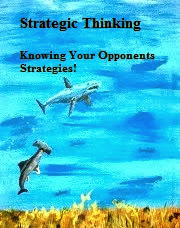 |
| Art Dr. Murad Abel |
Reviewing a number of game theory results
the authors Crawford, Costa-Gomes, and Iriberri (2013) discuss why people often
deviate systematically from equilibrium in game theory. By understanding why
some choices appear irrational (level-k) it is possible to better determine
under what circumstances such behavior is prevalent. Their paper reviews and
analyzes a large swath of game theory results to make some conclusions.
Strategic thinking is a natural part
of everyone’s life and influences everything from school choice to business decisions. In game theory each person seeks to maximize their payoffs based upon
predicting the choices of others by assuming the rationality of the other
players. This is called bounded rationality as all players work under the same
assumptions.
There is also something called
level-k responses. It is an assumption that all players actions will
improve in an attempt to take the dominant stance that eventually leads to
equilibrium. A level-k response would indicate that a person is making
decisions outside of shared understandings of “rational” choice. This
indicates the person’s cognitive model and assumptions of the game may be
different than other players.
Because there is a lack of
information when a game starts, some players recognize this ambiguity and avoid
dominant positions that often fit within the equilibrium model. Each person
responds to the game with a personality type that impacts the types of
decisions they make. It is their personal beliefs that help them develop a
strategy for dealing with the components of a game and choosing certain
patterns.
Equilibrium is seen as rationality with a common belief
among players. The more evidence a person obtains from the game the more
accurate and rational their decisions. Players often make larger and wilder
maneuvers in the beginning of a game and then move to define choices toward
the later part of the game as they begin to understand the rules.
Using a concept called level-k models it is possible to see
how certain behaviors move away from equilibrium choices and under what
circumstances such behavior can be expected. Many poor decisions may be made
from a lack of time, information, or cognitive deficiencies. Yet it is possible to find that level-k
decision-making may have some advantages in resolving games and conflict.
In a level–k decision it is believed that the player is
making decisions regardless of the other players within the game. Level-1
players have higher cognitive hierarchies than Level-0 players and believe others are playing at
a lower level. So and so forth up the chain of complexity. Higher level
thinkers (i.e. L3 players) may come to the conclusion that the game takes into account many
different levels of strategic thinkers and their actions are based upon the
aspects of their complex environment.
Expanding on the concepts within the paper it is important
to make a distinction between irrational behavior and perceived irrational
behavior. In small games with clearly defined rules the rational choices are
obvious. In larger games without restrictions, what is seen by one as irrational choice may yet be the most rational choice. These choices may depend on objective,
environmental testing behavior, countering limited thinking of other players,
or even drawing in the behavior of other players.
Strategic thinking is important as organizations seek to
move from local to global marketplaces where the environment has many more
options and choices. The perception of rationality is based upon the abilities
of those who are doing the judging and their ability to understand the
environment or the behavior. As cognitive complexity
rises so does the ability of individuals to make choices where the strategic purpose of the decisions are not immediately apparent to lower level thinkers. This could be an advantage in and of itself.
Crawford, V., et. al. (2013) Structural
models of nonequilibrium strategic thinking: theory, evidence and applications.
Journal of Economic Literature, 51
(1).




